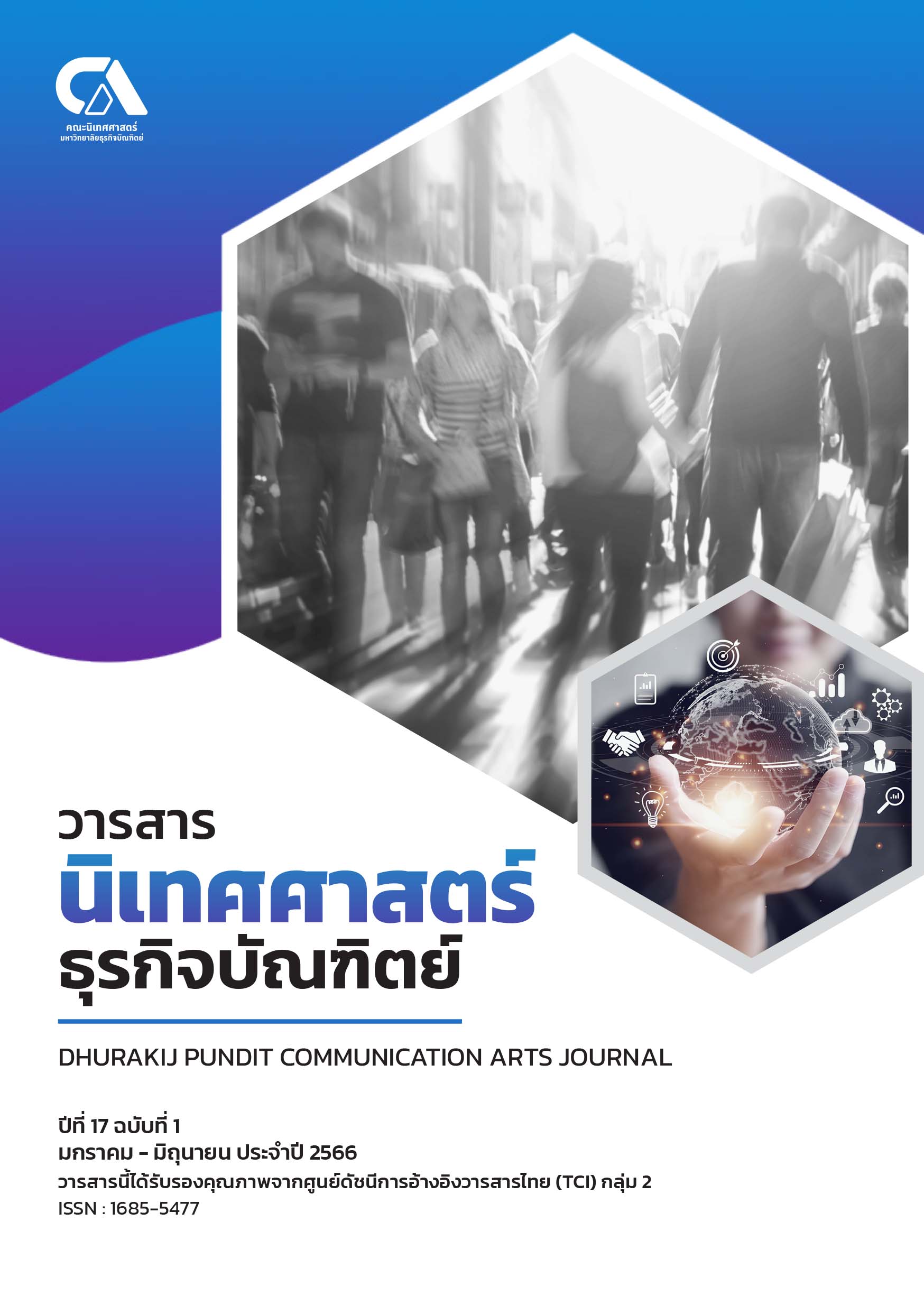The Influence of Thailand's Reputation on Tourism Brand Equity from the Point of View of Domestic Tourists
Keywords:
Country Reputation, Brand Equity, TourismAbstract
This research aimed to study the influence of Thailand's reputational factors on tourism brand values from the point of view of Thai tourists. The study was quantitative research, collecting data with questionnaires from 400 tourists by simple sampling in Bangkok, Chonburi, Ayutthaya, Surat Thani, Phuket, Chiang Mai, UbonRatchathani, and Sukhothai, 50 persons in each area. Data was analyzed using number, percentage, average, standard deviation, One-way ANOVA and Multiple Regression analysis. It was found that 1) the opinions of Thai tourists on Thailand's reputation, overall at the moderate (average = 3.29, S.D. = 0.79) The highest average side is cultural at the highest level (average = 4.22, S.D. = 0.67) 2) the opinions on Thailand's tourism brand values, overall to a considerable extent (average = 3.54, S.D. = 0.64), the highest average side is the loyalty to the tourist attractions at the highest level (average = 3.90, S.D. = 0.77) 3) the sample has different opinions on Thailand's reputation, and there are different opinions on the value of Thailand's tourism brands. (P-Value = 0.00) 4) Multiple regressions have been found to be the best models that include: (1) Thailand has a good atmosphere such as wholesome weather, optimum temperatures, etc. (2) Thailand has the potential to take care of and protect visitors, (3) Thailand has a diverse society and culture, Thailand's tourism brand values can be forecasted 67 percent (R Square = 0.670)
References
กฤชณัท แสนทวี. (2562). แนวทางการสร้างภาพลักษณ์ประเทศไทยสู่การเป็นแหล่งท่องเที่ยวเชิงอาหารในกลุ่มประเทศสมาชิกอาเซียน. วารสารวิชาการนวัตกรรมสื่อสารสังคม, 7(2), 59-70. https://so06.tci-thaijo.org/index.php/jcosci/article/view/233220/160041
ภราเดช พยัฆวิเชียร.(2558). ท่องเที่ยววิถีไทย มั่งคั่ง และยั่งยืน ได้อย่างไร. ในเอกสารประกอบการประชุมทางวิชาการ เรื่อง ท่องเที่ยววิถีไทย, กรุงเทพฯ: สำนักงานกองทุนสนับสนุนการวิจัย.
สำนักงานปลัดกระทรวงการท่องเที่ยวและกีฬา. (2560). แผนพัฒนาการท่องเที่ยว ฉบับที่ 2 (พ.ศ. 2560-2564). กรุงเทพฯ: สำนักงานกิจการโรงพิมพ์องค์การสงเคราะห์ทหารผ่านศึก.
สำนักงานสถิติแห่งชาติ และการท่องเที่ยวแห่งประเทศไทย (2557). การสำรวจพฤติกรรมการเดินทางท่องเที่ยวของชาวไทย. กรุงเทพฯ: สำนักสถิติเศรษฐกิจและสังคม.
Aaker, D. A. (1991). Managing Brand Equity. New York: Free Press.
Aaker, D. A. (1996). Building strong brand. New York: Free Press.
Berens, G.; Fombrun, C. J.; Ponzi, L. J.; Trad, N. G. and Nielsen, K. (2011). Country RepTrak™: A Standardized Measure of Country Reputation. International Place branding Yearbook 2011. Palgrave Macmillan, a division of Macmillan Publishers Limited.
Blain, C., Levy, S., and Ritchie, J. R. (2005). Destination Branding: Insights and Practices from Destination Management Organizations. Journal of Travel Research, 43(4), 328–338.
Bromley, D. B. (1993). Reputation, Image and Impression Management. Chichester: John Wiley.
Cai, L. A. (2002). Cooperative Branding for Rural Destinations. Annals of Tourism Research, 29(3), 720–742.
Ferris, S. P., Jagannathan, M., and Pritchard, A. C. (2003). Too Busy to Mind the Business? Monitoring by Directors with Multiple Board Appointments. The Journal of finance, 58(3), 1087-1111.
Fombrun, C. J. (1996). Reputation: Realizing Value from the Corporate Image. Harvard Business School Press Boston, Massachusetts, USA.
Fombrun, C. J. and Rindova, V. (1996). Who’s Tops and Who Decides? The Social Construction of Corporate Reputation. New York University, Stren School of Business, Working Paper.
Gnoth, J. (2002). Leveraging Export Brands through a Tourism Destination Brand. Journal of Brand Management, 9(4), 262–280.
Hanlan, J. and Kelly, S. (2005). Image Formation, Information Sources and Iconic Australian Tourist Destination. Journal of Vocation Marketing, 11(22), 163-177.
Konecnik, M., and Gartner, W. C. (2007). Customer-Based Brand Equity for a Destination. Annals of Tourism Research, 34(2), 400-421.
Lin, Z., Li, D., and Huang, W. (2003). Reputation, Reputation System and Reputation Distribution-An Exploratory Study in Online Consumer-to-Consumer Auctions. In Current Security Management & Ethical Issues of Information Technology, January, 249-266.
Mazurek, M. (2000). Tourism Destination Branding: A Competitive Marketing Strategy - Does it Really Matter? A Case Study of Kremnica, Slovakia. The 4th Graduate Research Symposium by Travel and Tourism Research Association Canada.
Morgan, N., Pritchard, A. and Pride, R. (2001). Destination Branding: Creating the Unique Destination Proposition. Butterworth-Heinemann. 1st edition.
Papadopoulos, N. and Heslop, L. (2002). Country Equity and Country Branding: Problems and Prospects. Journal of Brand Management, 9(4-5), 294-314.
Pike, S. (2005). Tourism Destination Branding Complexity. Journal of Product & Brand Management, 14(4), 258-9.
Ritchie, J. R. and Ritchie, J. B. (1998). The Branding of Tourism Deatination. In Annual Congress of the International Association of Scientific Experts in Tourism, Morocco, 2. N.p.
Šmaižien, I. & Oržekauskas, P. (2006). Corporate Image Audit. Vadyba/ Management, 1(10), 89-96.
Taro Yamane. (1973). Statistics: An Introductory Analysis. 3rd Ed. New York. Harper and RowPublications.
Uhrenholt, H. (2008). Destination Branding of NYC: Creating a Destination Brand Identity. Master’s Thesis. Faculty of Business language Aarhus University, Denmark.
Yang, S.; Shin, H.; Lee, J. and Wrigley, B. (2008). Country Reputation in Multi dimension: Predictors, Effects, and Communication Channels. Journal of Public Relations Research, 20(4), 421-440.
Yousaf, S. and Li, H. (2015). Social Identity, Collective Self-Esteem and Country Reputation: the Case of Pakistan. Journal of Product & Brand Management, 24(4), 399–411.
Downloads
Published
Issue
Section
License
Copyright (c) 2023 Dhurakij Pundit Communication Arts Journal

This work is licensed under a Creative Commons Attribution-NonCommercial-NoDerivatives 4.0 International License.
ลิขสิทธิ์เป็นของวารสาร....




